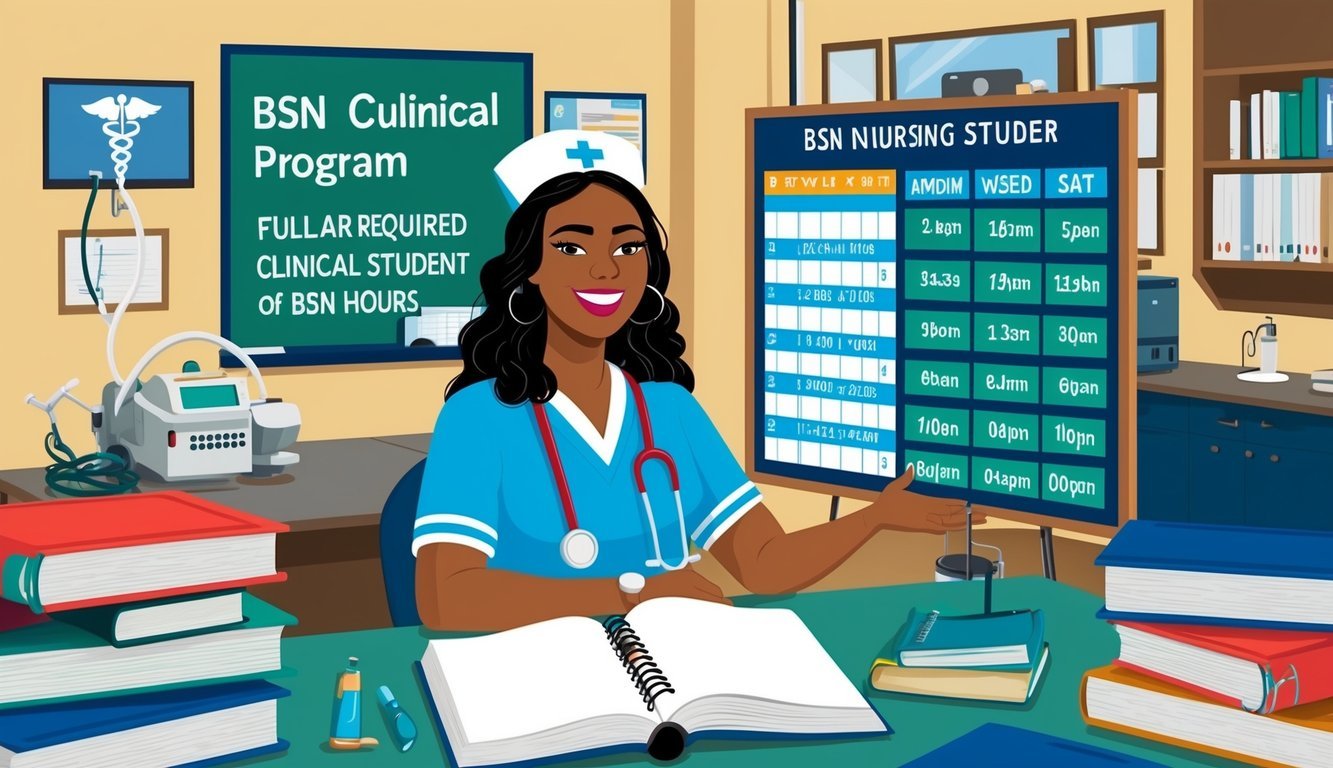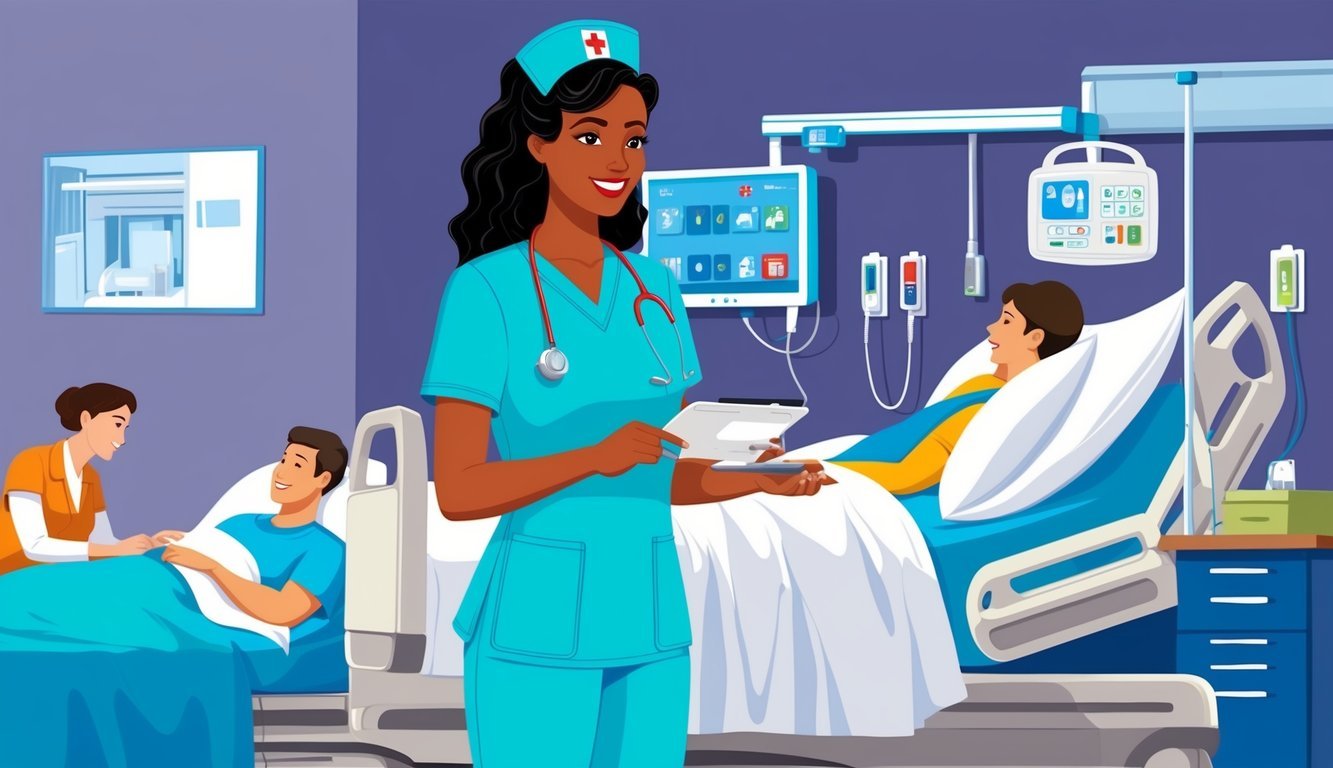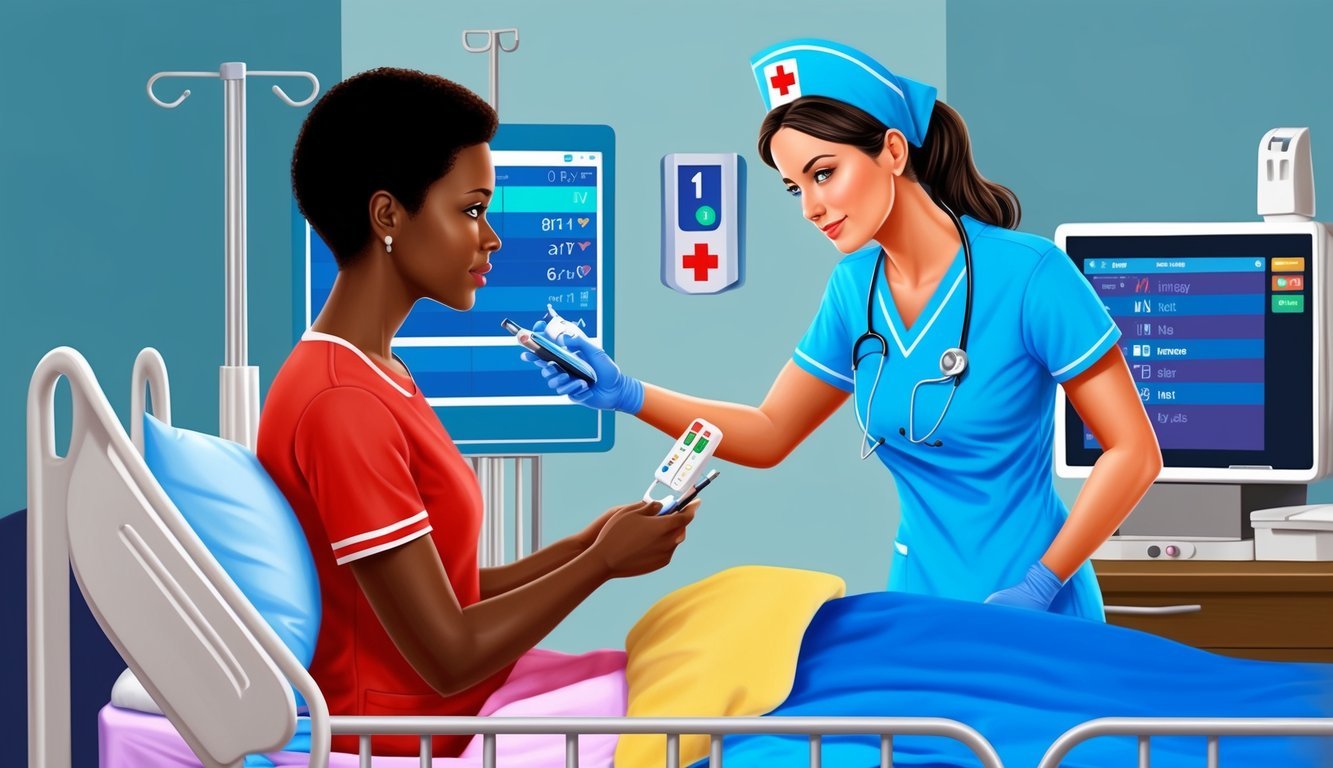When you consider a Bachelor of Science in Nursing (BSN), you need to understand the clinical hour requirements.
Most BSN programs require between 400 to 1,200 clinical hours, depending on the institution and state regulations.
These hours are crucial, as they provide the hands-on experience you need to transition smoothly into the nursing profession.
Each nursing school may have its specific guidelines regarding clinical placements, impacting how you accumulate these hours.
In general, these practical experiences typically involve working directly with patients in healthcare settings, allowing you to apply classroom knowledge in real-world scenarios.
Exploring various BSN programs will help you find one that aligns with your career goals and logistical needs.
To get a clearer picture of what to expect, you can check the specific requirements of different nursing schools.
Researching programs such as those covered in resources like Nurse.com or NurseJournal.org can guide you in making an informed choice about your BSN education.
Educational Pathways in Nursing

Navigating the educational pathways in nursing can significantly affect your career trajectory.
You have several options, each with its own requirements and benefits.
Understanding these pathways will help you determine the route that best suits your goals.
Associate Degree in Nursing (ADN) vs. Bachelor’s Degree
The Associate Degree in Nursing (ADN) is typically a two-year program offered by community colleges.
This pathway allows you to obtain the necessary skills to become an entry-level nurse quickly.
Admission requirements often include a high school diploma or equivalent, along with prerequisite courses in subjects like chemistry and biology.
In contrast, a Bachelor of Science in Nursing (BSN) generally takes four years to complete and is available at universities.
BSN programs provide a more comprehensive education, incorporating advanced nursing topics and critical thinking skills.
They often require a higher GPA for admission and may include additional prerequisites.
| Degree Type | Duration | Admission Requirements | Key Benefits |
|---|---|---|---|
| ADN | 2 years | High school diploma, prerequisites | Quick entry into the nursing field |
| BSN | 4 years | Higher GPA, additional prerequisites | Advanced skills, better job prospects |
RN to BSN Programs
RN to BSN programs are designed for registered nurses who already have an ADN and want to earn a BSN.
These programs typically take about one to two years and can often be completed online, offering flexibility for working nurses.
Admission requirements generally include an active RN license and completion of an ADN program.
You will cover subjects such as community health, gerontology, and evidence-based practices.
Many healthcare employers prefer or require RNs to hold a BSN, making this pathway increasingly popular.
Accelerated BSN Programs
If you already hold a bachelor’s degree in another field, an Accelerated BSN program may be an ideal choice.
These programs allow you to earn your BSN in a condensed timeframe, often within 12 to 18 months.
Admission requirements typically include a bachelor’s degree, specific prerequisite courses, and a competitive GPA.
The curriculum is rigorous and combines theory with clinical practice, allowing you to enter the workforce quickly.
This pathway is particularly appealing to career changers eager to join the nursing profession.
Core Curriculum and Specializations

The core curriculum for the Bachelor of Science in Nursing (BSN) program is designed to equip you with essential knowledge and skills.
It encompasses various areas including patient care, pharmacology, nursing informatics, and public health nursing.
Each of these components plays a critical role in your training and future practice.
Fundamentals of Patient Care
The Fundamentals of Patient Care course serves as the foundation for your nursing education.
You will learn about essential nursing skills such as vital signs monitoring, patient assessments, and basic care techniques.
Clinical rotations provide the practical application of classroom knowledge, allowing you to engage directly with patients.
You will also gain insights into evidence-based practice, emphasizing the importance of integrating research findings into patient care.
Essential nursing theories guide your approach, promoting holistic care and patient-centered practices.
Pharmacology and Health Care
In the Pharmacology course, you will explore the principles of medication management.
Understanding drug classifications, mechanisms of action, and therapeutic effects is vital for safe patient care.
You will study how to calculate dosage, recognize potential interactions, and address side effects.
This knowledge is critical when developing medication plans and educating patients about their treatments.
Key aspects such as pharmacokinetics and pharmacodynamics will also be covered to deepen your understanding of how medications work within the body.
Nursing Informatics and Technology
Nursing Informatics and Technology is increasingly important in modern healthcare.
In this course, you will learn how to use health information systems that improve patient outcomes and streamline care processes.
Topics include electronic health records (EHR), data management strategies, and telehealth technologies.
Understanding these tools aids in utilizing data for clinical decision-making and supports evidence-based practice.
The integration of informatics into nursing enhances your ability to provide quality care and improves communication among healthcare teams.
Public Health Nursing
The Public Health Nursing course emphasizes the broader view of health within communities.
You will study epidemiology, health promotion, and disease prevention strategies that affect population health.
Assessing community needs and resources is crucial for developing effective interventions.
You will engage with diverse populations, learning how social determinants of health impact patient care.
Public health nursing prepares you to work in various settings, advocating for policy changes and promoting health education in communities.
Clinical Experience Requirements

In nursing school, clinical experience is vital for applying theoretical concepts in real-world settings.
You will engage in various clinical rotations that emphasize different aspects of patient care.
Understanding the specific clinical experience requirements will prepare you for success in your nursing education.
Acute and Long-Term Care Settings
Clinical hours in acute and long-term care settings are crucial for developing your nursing skills.
Typically, you will complete around 500 to 1,200 clinical hours, depending on your program and state requirements.
| Setting | Typical Hours Required |
|---|---|
| Acute Care | 300 – 800 |
| Long-Term Care | 100 – 400 |
In acute care environments, you’ll interact with diverse patient populations, enhancing your ability to manage critical situations.
This includes working with patients in hospitals and emergency departments.
Conversely, long-term care focuses on chronic conditions, geriatric care, and rehabilitation, where you’ll learn to provide ongoing support.
Specialized Clinical Rotations
Specialized clinical rotations expose you to various healthcare fields, allowing you to gain insights into specific nursing roles.
You can expect to rotate through areas such as pediatrics, maternal and child health, and mental health.
These rotations typically consist of 50 to 150 hours each, depending on your chosen specialty.
Exposure to these fields helps solidify your interests and identify your future career path.
Working in specialized areas often involves collaboration with multidisciplinary teams, so you’ll develop teamwork and communication skills essential in healthcare.
Clinical Instructor Supervision
Clinical instructors play a vital role in your educational journey by providing guidance during clinical practice.
They supervise your hands-on experiences in various settings, ensuring you meet the necessary competencies.
Instructors evaluate your performance through direct observation and feedback, which aids in your professional development.
You may receive one-on-one supervision or be part of a larger group, depending on the setting and instructor availability.
Having a supportive clinical instructor can enhance your learning experience by helping you navigate challenges and providing valuable insights into best practices in patient care.
Licensure and Certification

Obtaining licensure and certification is essential for your nursing career.
This process involves passing the NCLEX-RN exam, meeting state-specific requirements, and pursuing continuing education to maintain your credentials.
NCLEX-RN Exam Preparation
To become a Registered Nurse (RN), you must pass the NCLEX-RN exam, which assesses your knowledge and skills.
Effective preparation is crucial.
Consider using study resources like review books, online courses, and practice tests.
College programs often provide preparatory courses to help you feel confident.
The exam consists of multiple-choice questions covering topics such as:
- Safe and Effective Care Environment
- Health Promotion and Maintenance
- Psychosocial Integrity
- Physiological Integrity
Familiarizing yourself with the exam format and question types will enhance your chances of success.
Joining study groups or online forums can also provide support and insights from fellow nursing students.
State Licensure Requirements
Each state has unique licensure requirements for becoming an RN.
These typically include:
- Proof of completion of an accredited nursing program
- Passing the NCLEX-RN exam
- Completing a criminal background check
To find specific requirements for your state, visit the NCSBN website.
Most states require you to apply for your professional license through their nursing board, which may also have additional documentation or fees involved.
Continuing Education and Certifications
After obtaining your license, many states require continuing education to maintain your RN status.
This may involve completing a set number of Continuing Education Units (CEUs) every few years.
You may also consider pursuing specialty certifications, such as Certified Pediatric Nurse or Critical Care Registered Nurse.
Certifications can enhance your qualifications and career opportunities.
Staying informed about your state’s specific requirements, such as the Nurse Practice Act, will help you maintain your licensure and remain compliant.
Professional Skills and Employment

In your nursing career, honing professional skills is crucial for success and improved employment prospects.
Key areas include leadership, communication, and interdisciplinary collaboration, which are essential for providing high-quality patient care in diverse settings.
Leadership and Management in Nursing
Leadership skills are vital for registered nurses, especially as you advance in your career.
Effective nursing leaders influence the practice environment, improving patient outcomes and team cohesion.
You will learn to manage change, guide healthcare teams, and promote quality improvement initiatives.
Courses in nursing education often emphasize leadership training, helping you develop the capability to assess and respond to complex situations.
Understanding management principles will enable you to make informed decisions, allocate resources efficiently, and advocate for your team.
A strong leader inspires and motivates colleagues, fostering a culture of reliability and accountability in high-stress healthcare scenarios.
Interdisciplinary Collaboration
Interdisciplinary collaboration is integral to modern healthcare.
As a nursing major, your ability to communicate and work with diverse teams influences patient outcomes significantly.
This teamwork involves collaboration with physicians, pharmacists, social workers, and other healthcare professionals.
Effective interdisciplinary teamwork requires a deep understanding of each member’s role, fostering respect and shared goals.
Participation in collaborative initiatives allows you to enhance your problem-solving skills and understand patient care from multiple perspectives.
You should leverage collaborative opportunities during your clinical hours to practice team-oriented strategies.
This real-world experience helps build the relationships necessary for effective collaboration in your future role as a registered nurse.
Communication and Critical Thinking
Nursing relies on effective communication.
Your ability to convey information clearly impacts patient care and safety.
In clinical settings, you will practice professional communication skills.
You will learn to interact with patients, families, and colleagues effectively.
Critical thinking complements communication skills.
As you assess patient needs, you must interpret data and make informed clinical decisions rapidly.
Nurses often face complex scenarios that require analyzing contradictory information and prioritizing patient needs.
Developing these skills will empower you to advocate for your patients.
You will also engage in meaningful dialogues with other healthcare professionals, contributing to patient-centered care.
Job Market and Employment Prospects
As you complete your education, understanding the job market will guide your career planning.
The demand for registered nurses remains strong, driven by an aging population and increased healthcare needs.
According to the Bureau of Labor Statistics, registered nurses will see significant employment growth in the coming years.
Major employers include hospitals, outpatient care centers, and long-term care facilities.
Consider specializing in fields like geriatrics, pediatrics, or critical care to enhance job prospects.
Networking during your clinical hours can also lead to job opportunities.
Building connections with professionals in the field will help you navigate the competitive landscape and secure desirable positions.

